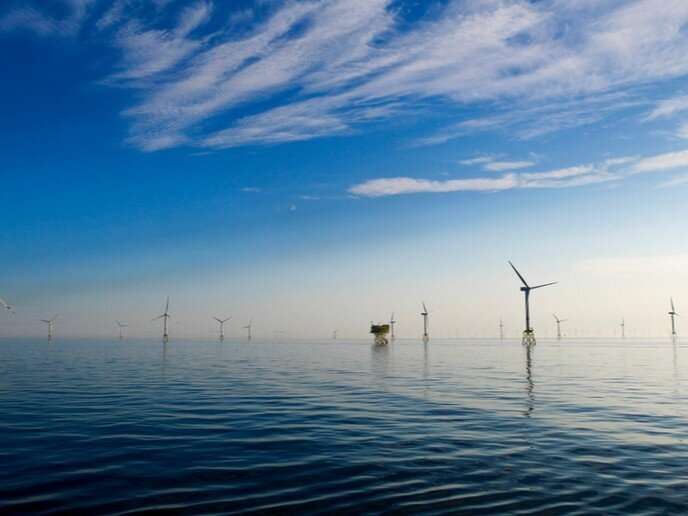Credit: Kaisn
Offshore wind power's expansion is expected to continue, boosting efforts to decarbonize energy systems as it becomes a growing part of electricity supply. According to the International Energy Agency (IEA), the global offshore wind market grew about 30 percent per year between 2010 and 2018. The IEA predicts that "global offshore wind capacity may increase 15-fold and attract around $1 trillion of cumulative investment by 2040," as stated in a news release. The IEA notes that "Europe has pioneered offshore wind technology, and the region is positioned to be the powerhouse of its future development." In its key findings from Offshore Wind Outlook 2019, the IEA states: "The growth of the offshore wind industry has been fostered in European countries bordering the North Seas, where high quality wind resources and relatively shallow water have provided exceptionally good conditions in which to develop offshore wind technologies and bring them to market." Parallel to this growth, an offshore power grid is also developing in the North Sea.
In fact, the North Sea offshore grid, interconnecting national electricity grids and connecting offshore wind farms to shore, is a major infrastructure priority for the EU. However, integrated, hybrid offshore projects are still scarce in Europe. Addressing this challenge and seeking to develop meshed high-voltage direct current (HVDC) offshore grids, the EU-funded PROMOTION project has outlined the framework required for such an infrastructure.
Project partners also made recommendations for policymakers and other stakeholders to facilitate the development of the first hybrid assets. These were published in PROMOTION's latest project report. It defines an offshore hybrid asset as "a transmission line which combines the connection of offshore wind farms with interconnection between multiple countries."
Coordination and cooperation
The report focuses on the legal, economic, governance and financing issues that need to be addressed for a successful meshed offshore grid (MOG). "It requires substantial coordination among stakeholders to design and implement a sound legal and regulatory framework, system of governance and raise sufficient funding, as well as construct and operate the network."
According to the report, it's essential for EU and national decision-makers to "commit to cross-disciplinary cross-border coordination and cooperation in order to capture the full benefits of a North Sea MOG." To achieve this, "it is necessary to adopt an international agreement to which the states participating in the MOG, as well as the EU (as the competent authority for many energy market related topics) are signatories." Project partners emphasize that such an agreement "provides legal certainty for the states, the grid owners and the parties connected to the grid."
Quoted in a press release, Ditlev Engel, CEO of PROMOTION project coordinator DNV GL Energy, states: "The development of a reliable transnational European offshore transmission grid is a key enabler for a successful, cost effective and timely energy transition. This project delivered a great framework with regulatory and financial guidelines for national governments to speed up collaboration on the joint development of energy infrastructure such as offshore transmission grids."
The PROMOTioN—Progress on Meshed HVDC Offshore Transmission Networks—project ends in December 2019. It was set up to develop and demonstrate cost-effective and reliable technologies for wind power transmission with a sound political, financial and legal regulatory framework.
More information: PROMOTION project website: www.promotion-offshore.net/
Provided by CORDIS
























